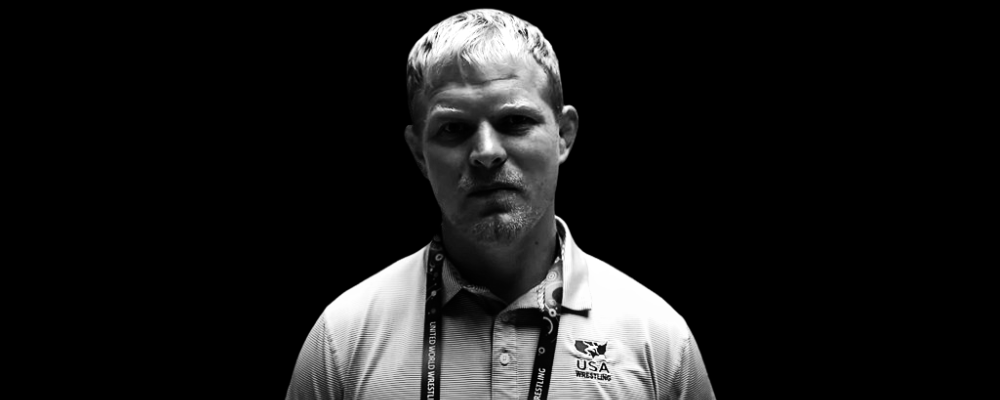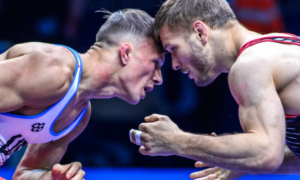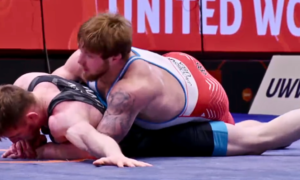To begin, one must ask themselves a question: What is currently the most important job in the United States Greco-Roman program?
The natural first answer would be the role which belongs to Herb House. House is the US National Team head coach, the most out-in-front spot available. The buck stops with him. House is the overseer of daily operations, the planner and coordinator of training plans, the principle delegator of responsibilities, and, obviously, an actual coach for athletes at tournaments and camps. The National coach is the most visible figurehead associated with any sports organization, and so if House is your pick, he’s as appropriate of a choice as it gets.
Or maybe it is the National Programs Director for Greco-Roman, Justin Ruiz. The title once tethered to this bundle of chores was that of General Manager. Though the phrasing has changed, the objectives associated therein by and large have not. Ruiz — who was a World bronze medalist in 2005 and enjoyed a long and productive international career overall — still loves to get on the mat and share insights with his charges whenever space allows for him to do so. But mainly, he is the chief executive, as well as the primary securer of resources. He also approves plans, helps determine scheduling, is the go-to voice with regards to staffing, and serves as a vital sounding board upon whom both athletes and coaches can rely should they have meaningful concerns.
Suffice it to say, if your answer is Ruiz, no one should posit a debate to the contrary.
Given its leadership structure, along with how and where it resides within USA Wrestling, the National Greco-Roman program ticks according to the decisions and effectiveness of House and Ruiz. There is no avoiding this fact.
It is just that, at this moment, and when considering the needs and substantive challenges facing Greco-Roman’s long-term viability in these United States, the most potentially-impactful job in the sport must center around recruitment, retention, education, and relationship-building. This role has to involve a certain degree of persuasion, for it requires steering misguided young wrestlers and their coaches away from false narratives. And it must all be communicated from a source of extensive knowledge, so long as said source can express what needs to get done without even the barest hint of conceit or condescension.
Right now, the development of Greco-Roman athletes is the biggest issue in America and the man in charge of addressing it is Cheney Haight.
Haight, 40, a multi-time World Team member and National champ, was named the country’s Developmental Coach in January of last year, just as the latest regime for the Greco program took hold. So esteemed is his reputation for technical expertise that the announcement of his hiring brought with it a breath of fresh air. As a competitive wrestler, Haight had been revered by his contemporaries for his grasp of the discipline’s vast array of nuances and an ability to filter what he was explaining into a language all could understand. This is why as an active athlete, teammates of his at the Olympic Training Center went to him for advice on technique nearly as much as they did the coaches. The knowledge base beholden to Haight is encyclopedic, but how that information is disseminated is of equal value.
Haight easily opens up about wrestling and is a tremendous demonstrator of technique, but you would certainly not mistake him for an extrovert. He admits below that his low-key mannerisms probably incited second-guesses among leadership prior to being hired. In a way, it’s understandable. Haight is so completely unassuming, so utterly bereft of pretense, that it was difficult for some to imagine him as a guy whose job demands not just a lot of talking, but also selling. Selling concepts, selling a philosophy, selling to young, would-be Greco wrestlers and their parents what a future in the sport might have to offer. You normally associate such a task-set with boisterous, outgoing coaches, and Haight is the opposite of that. Therefore, it was not unfair to wonder how a front-facing role would suit him.
But what’s missing from that equation is one simple component: people latch onto humility and they embrace authenticity. They’ll buy both commodities all day long. Such is why two of Haight’s longtime friends and fellow World-level competitors, Andy Bisek at Northern Michigan and Spenser Mango at Army/WCAP, have become successful Senior coaches. Neither Bisek or Mango are ever the loudest guys in a room. Their shared biggest strength is listening and relating to athletes. This, too, is Haight’s wheelhouse, albeit in a slightly different realm. When the topic is how to improve at Greco-Roman wrestling, or how to enthuse people to get involved, Haight can hold court with the best of them. Which is all that really matters. He listens. Then listens some more. And when it is time for others to stop talking, Haight quickly finds his groove. Dissecting, analyzing, and explaining the virtues of Greco-Roman is the zone in which Haight prefers to find himself and his job revolves around doing so.
Through his first 18 months on the job, Haight has helped orchestrate changes to the manner in which age-group camps are held and instructed, increased the reach of the US program into regions of the country where Greco is not a hot-ticket item, traveled to every relevant event featuring youth competitors, coached at dozens of clinics, and forged relationships with countless new coaches and supporters. On top of everything else, he is still a “room coach” at the OTC when time allows along with head guy Ismael Borrero Molina, the Olympic and two-time World champ who defected from Cuba to the US in ’22.
You don’t get the kind of things done Haight has on his checklist by being a mute.
But the work continues. Greco-Roman wrestling in the United States is mired in a generation-long battle to win the hearts and minds of athletes who, if for no other reason than a stubborn adherence to traditional wrestling culture norms, are apt to bypass the style in totality after high school. The American program also has to contend with coaches and administrators who actively steer students away from Greco once they actually are in college, and then there is the little matter of providing foundational tools and resources for those who intimate interest in seeing how far they can go in what is the most popular form of wrestling in the world — but is otherwise neglected on these shores. Mind you, Haight, and the USA Greco leadership altogether, have to do all of this while every other national federation boasts the luxury of not having to worry about how deep their talent pools will be on a yearly basis.
Haight is only one piece of the machine that is being deployed to somehow restore the United States’ status as a meaningful presence on the international Greco-Roman wrestling landscape. But once you properly comprehend the longstanding obstacles standing in the program’s path, in addition to the newer hurdles which have become more and more prevalent over the past decade, a fair argument could be made that, right now, he is its most important piece.
5PM Interview with Cheney Haight
5PM: As of now, your last match was in the finals the 2019 World Team Trials. Between that tournament and early last year, when you were named the USA Developmental Coach, when did the desire to coach in any capacity really become a goal for you?
Coach Cheney Haight: I think when I decided to step away from being an athlete. It was tough to not have the sport in my life a little bit, so I had to sit down and think about it. And I probably wouldn’t have coached had this opportunity not presented itself in my hometown. Because, there are just not a lot of opportunities in Greco for this. I was more considering opening up a club like Joe Uccellini (Curby 3-Style, NY) and going that route because that’s all there was I could do. That is probably what it was, just not having wrestling as a core part of my life is when I started to think about coaching.
5PM: Was there ever a time during that three-year space between the ’19 Trials and you taking on this role when you strongly considered returning to competition?
CH: Yes. Had COVID not happened I would have came back for another year. It was around ’20, I think. I was training with (Jake) Fisher a little bit; but when COVID happened, I kind of fell out of touch with what was going on with the program. Guys were scattered around and trying to find MMA gyms to train at, and it was kind of hard to keep up with. So, realistically, there was no way to do it. I mean, I could have showed up just for fun, but then you’re taking time off of work for that. At this stage, you have to be honest about what it takes, and I’ve been around long enough to know what it takes. You have to be all-in to even have a chance.
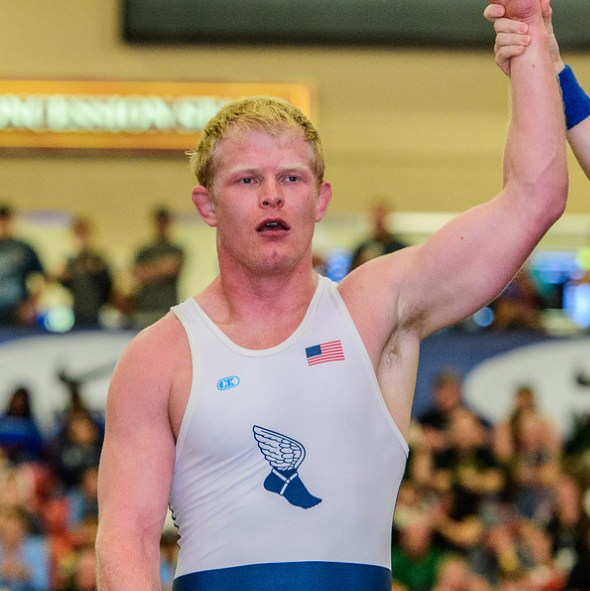
5PM: Virtually every one of your peers points to your technical knowledge, and your vast knowledge overall. That is your reputation among those who either know you well or have competed with and against you. How do you approach teaching young athletes who might not have the baseline yet for more advanced parts of the sport?
CH: If you’re teaching them on-the-feet and they’re coming from high school or college folkstyle — which is basically everyone in America — you have to start with positional stuff. There is a lot of motion in Greco but everything is operated off of a lot of pressure. There is not really much shuffling around, so you have to be able to learn how to use your legs, put pressure on people, and get a reaction that way in order to set up your attacks.
When I watch age-level nationals, even the guys in the US know a lot of moves. They know how to do an arm spin, they know how to do a headlock. They know how to do all of the stuff international guys do — but they don’t know how to do it from a closed position. There are a few other things. Guys don’t know how to do a back-step properly that you can teach, but it’s a lot basic stuff. Even the stuff I do, when I think of the moves I was good at, everything was kind of basic. Arm throw, headlock, arm drag, bodylock… I didn’t do a lot of fancy stuff, but I was pretty good at positional work. Just getting two-on-ones and underhooks, and learning how to set up techniques from there. They have to change the way that they are setting up their attacks. Their whole position has to change.
That’s the first step, changing the way their position is, changing the way their motion is, putting pressure on their opponents, and feeling that pressure coming back at them. I mean, that’s probably an issue that we have at the Senior level.
The short answer is just position and learning how to do stuff off of pressure. Greco is like trying to wrestle in a phone booth. It’s like dirty boxing. Everything is up close and it’s a brawl. You have to be able to stay in good position. Just giving up an underhook is hard not to do. How do you fight and not extend your arms when you’re pushing and pulling like that? Training position is the biggest thing and coaches have to work with their kids on the feet.
5PM: There are some older athletes, from the generation before you, who would agree with everything that you are saying. They think that there is an overvalue on “moves” compared to position. Is correcting this misinterpretation of development our program’s biggest challenge?
CH: Yes. I mean, you don’t have to teach position first. You can kind of teach it at the same time. The way I was taught by Ivan (Ivanov), he taught us how to back-step but you have to teach position, also. I think what is going on with our country is that they don’t teach it at all. They’ll mix their freestyle and Greco practices together and just show Greco moves. It’s not like you don’t teach these moves, but they are not teaching position at all. It happens at Worlds. We have guys who place sometimes, but that is just because America has awesome competitors. A lot of times, the reason why we are losing is #1, par terre kills us; and #2, we go over there and give up underhooks. We get killed in position.
But the way that you teach position can be a challenge for coaches because it’s not a move. You can’t just say “Go drill this”. Position practices are probably some of the hardest practices there is. I usually keep these practices down to an hour because these sessions have to be live. You’re just telling them “Don’t reach”, “Re-pummel”, and “Get your two-on-one”. But it is kind of muscle memory and you have to learn it while you’re doing it. You’re doing a lot of one-minute go’s. Maybe coaches need to learn a lot of the drills in order to be able to teach this stuff.
5PM: Over the past two quads, we have seen some high school kids come over to Greco full-time. There have also been more age-group wrestlers competing and training overseas throughout each season between Lucas (Steldt) and whomever else. Do you think that this is a necessity for our country? Or do you think so long as the US gets them at 18 or 19 at NMU or the OTC, it’s just as good?
CH: I think it is a positive to get them started earlier. There are a few benefits from collegiate that kind of makes us fighters. But I think that the benefits of starting earlier far outweigh the benefits of doing collegiate. Some of this par terre and position stuff I’m talking about has to be developed, and you have to be doing it consistently over a lot of years. The way other countries do their sport schools, from what I hear, is that by the time they graduate to the Senior level, they already know everything. Coaches are just teaching them how to compete at that point. In other countries, by the time you would get to Northern Michigan, you would already be a Senior trying to get on World Teams and earn medals. I think we’re starting too late in college.
Westley Bockert and Lucas Steldt — the more of that stuff we can get going, the better. Then if we can get a couple of other Northern Michigan-type places to send them to, that would be the best-case scenario. We have a couple in the works and I don’t want to say anything until they are finalized, but that is the kind of stuff I’m working on right now.
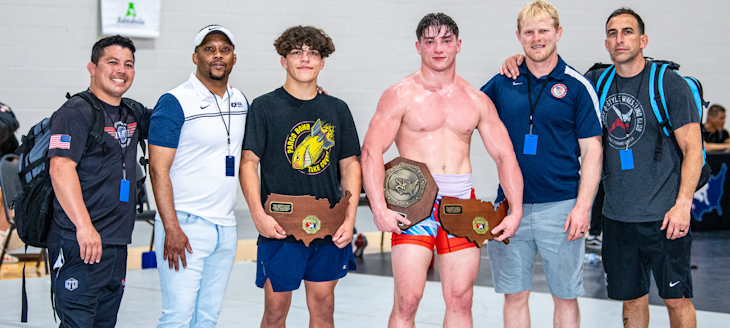
5PM: You are the “OG” in the country when it comes to Ivan’s students. You started with him earlier than everyone else, then you were with him at Northern, and then you trained with him after Northern for a while. How has Ivan’s influence on you influenced your own coaching and teaching style?
Coach Cheney Haight: I think one thing that Ivan did really well is that he explained to the athletes before practice what the purpose was for what we were doing. He would line us up. He would also write down his practices, and they were always shorter than most practices. He believed in quality over quantity. Instead of having you drill something 100 times, or for ten straight minutes, he’d have you drill in three sets of six. He would tell you what he wanted the partner doing and what he wanted you doing. You would be dead at the end of the practice but he was really good at getting a lot out of the athletes and he was able to do that without making them do 10,000 reps.
One thing that he has helped me with, and that I try to do when I’m coaching, is that I explain to the athletes what I’m trying to do with them and what the purpose of this practice is supposed to be. What the skills are that we’re trying to improve, and to make sure that everyone leaves this practice better than they were before they walked in the door. That’s what I think he was best at.
5PM: You do have to travel as part of your role but you also still get a lot of time with the guys who are at the OTC. What have you seen that you like out of this younger group at the Training Center?
CH: One of the things I’m most encouraged by is that this is a new group of guys. We have (Ismael) Borrero there now and I’m kind of just in the room as an assistant coach. I’m on the mat a lot more as a training partner than I was compared to when I first got hired. When I first got in there, I was doing a lot of the coaching until he got the hang of things.
With the new squad we’ve got, a lot of them were not considered top guys but they are all bought into what Borrero is doing. Everyone is a believer in what he is doing. I’ve been seeing a lot of improvement. You might not have seen it in a lot of the results from last year because a lot of them weren’t top-5 right off the bat. But you could see it in the room. I’m pretty hopeful that this next coming year we are going to see some good things out of them. Just how they have bought into the program is what I’m impressed by.
5PM: Speaking of Borrero, he comes attached to a remarkable resume with the World titles and the Olympic gold, and he was a top athlete for a long time. He is also from Cuba and is new to our country. How has the relationship between the two of you grown since working together? How do you complement what he does as a coach?
CH: He’s got his English good-enough to where everyone in the room knows what he is saying. His wrestling lingo is fine. He can run the practice, and he runs pretty good practices. He comes from a sports school in Cuba and, from what he has told me, you don’t go to that school to be anything but a coach. But he said that in Cuba, there are a couple of national coaches and they are there for like, 25 years. So a degree is kind of worthless over there, which is why a lot of them have been going into South America to coach.
He has a program going that is periodized and based on volume that everyone abides by throughout the year. I feel like we both agree on what I was saying earlier, how par terre and position have to be the top focus with these guys. We still have them working on their best moves and everything. He is the guy in the room who writes all of the practices and then I’m more the technical coach who walks around correcting technique, and sometimes I’m an extra workout partner. If a guy needs a partner, I can still wrestle with them. That kind of works out because I’m gone a lot of times at camps around the country doing development stuff. I would say that being the assistant coach is just something that I do when I’m there — but he has pretty much taken over the room and can handle everything. Everyone trusts what he does. Like I was saying before, everyone is bought in. He runs it like a clock.
5PM: Being head of development means that you are in front of people a lot. In front of new people a lot. You’re building relationships, doing camps and clinics. Is this a side of the sport that you had to grow comfortable with? The reason why I’m asking is because I think of you as the type who is not very outgoing unless someone knows you. Other than that, I definitely don’t see you as one of the most verbose people on the planet. So, is this a situation where you’ve had to come out of your shell a little bit?
CH: I think it’s what you just said. It’s not only if you know me. If we’re talking about a subject that I like, such as wrestling, then I don’t mind running practices and coaching clinics because I’m most at-home on the wrestling mat. Even when I was still competing, I liked teaching stuff. So, that hasn’t been a problem, clinics and things like that. I think that was kind of an issue when they were hiring me for this job. Like, am I going to be able to talk? When it comes to talking wrestling, I can do that.
5PM: Some think one of our biggest problems is recruiting. I happen to think retention is just as important. That said, both are issues. How is this addressed or strategized among yourself and the National program in terms of getting new bodies in the door?
CH: I think the issue with recruiting comes down to opportunity. Northern Michigan makes a huge impact on Greco in our country, but it’s not enough. If you are recruiting, you only have so many spots at the Training Center or at Northern Michigan. We have to figure out a way to get this more at a college level. One person I talk to quite a bit is Kerry Regner. He was able to do it in Arkansas (Williams Baptist University). It kind of fell apart when he left, he had gotten another job. But I think that proved it can be done.
It doesn’t make sense how we can grow without getting more opportunities at the college level. If you are recruiting a kid, his parents are making a lot of the decisions for him. And if you tell him that there are no college opportunities, it’s going to be a tough sell. That’s where I’m at with it. We’re doing pretty good. But Westley Bockert has guys, Lucas Steldt, Robby (Smith) has a lot of guys, Joe Uccellini has a lot of guys… We have to figure out where to send them. I think that they like wrestling Greco; but if someone is offering them a scholarship to wrestle collegiate, and no one is offering one for Greco, they are going to take it. That’s my opinion.
5PM: You’ve been official for about a year and a half. During this time, what have you learned the most, or from where have you seen the most growth, in what might be the most important job for Greco in the country right now?
CH: I do a lot of camps. I used to not really believe in clinics because I felt that kids did not pick up that much from them. But now I have kind of changed my opinion on it. In this country, that is the introduction to Greco for a lot of kids. Getting out there, I have learned just how foreign some of this is to coaches. A lot of the coaches are the ones who are most interested in these clinics when I go over there because they don’t know this stuff.
It has been eye-opening how new it is to some people. Where I came from in Utah, where we had Ivan… Utah is not a huge wrestling culture but there are some pockets where wrestling is big. I came from an area where all three styles were participated. When I went to Northern Michigan, I didn’t really understand how most of the country didn’t know anything about Greco. The biggest eye-opening thing is how much education we need to share with coaches around the country. With clinics, kids aren’t going to pick a lot up from me teaching them for two days over in their states. But we need to help the coaches because these are the people who will be working with the kids day-in and day-out. We need to provide more resources for them.
5PM: What does the rest of your summer look like heading into the fall?
Coach Cheney Haight: I’m going to have a busy August. A week before the U17 World Championships, for which we leave on the 16th and it is in Jordan, we have their last training camp. When I get back, we’re going to have the U20 camp and then I leave for Spain (U20 Worlds). So basically the U17 and U20 guys are going to be the main focus. I thought we had good teams last year but I think these teams are better and I’m excited about them. I think both the U17 and U20 World Teams are better than they were last year. I think we can get a couple of medals at U20. We have Aden (Attao), who has already medaled. And then we have a lot of talent in some of the other weight classes, like Otto Black and few of the others.
That’s what my August is going to be filled up with. September is going to be planning things out for the next year. That is when all of the kids will be on break.

Listen to “5PM57: Kamal Bey and David Stepanyan” on Spreaker.
Listen to “5PM56: Rich Carlson and Spencer Woods” on Spreaker.
SUBSCRIBE TO THE FIVE POINT MOVE PODCAST
iTunes | Stitcher | Spreaker | Google Play Music


